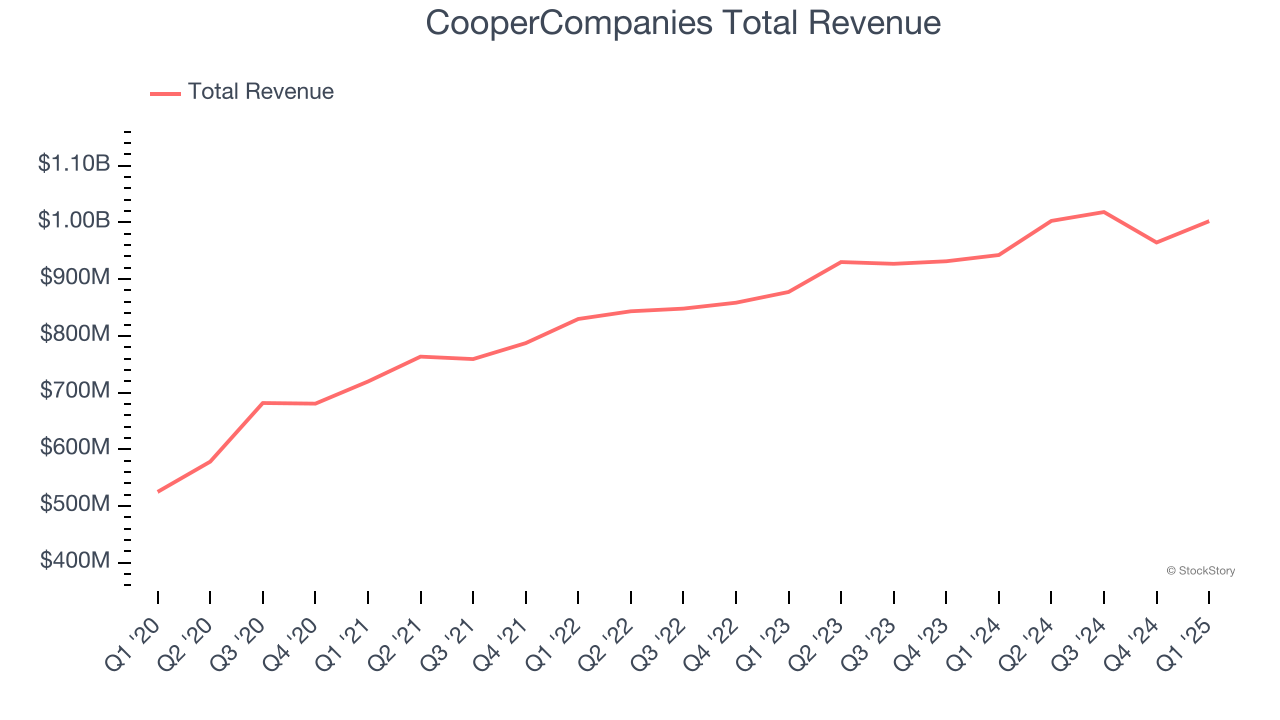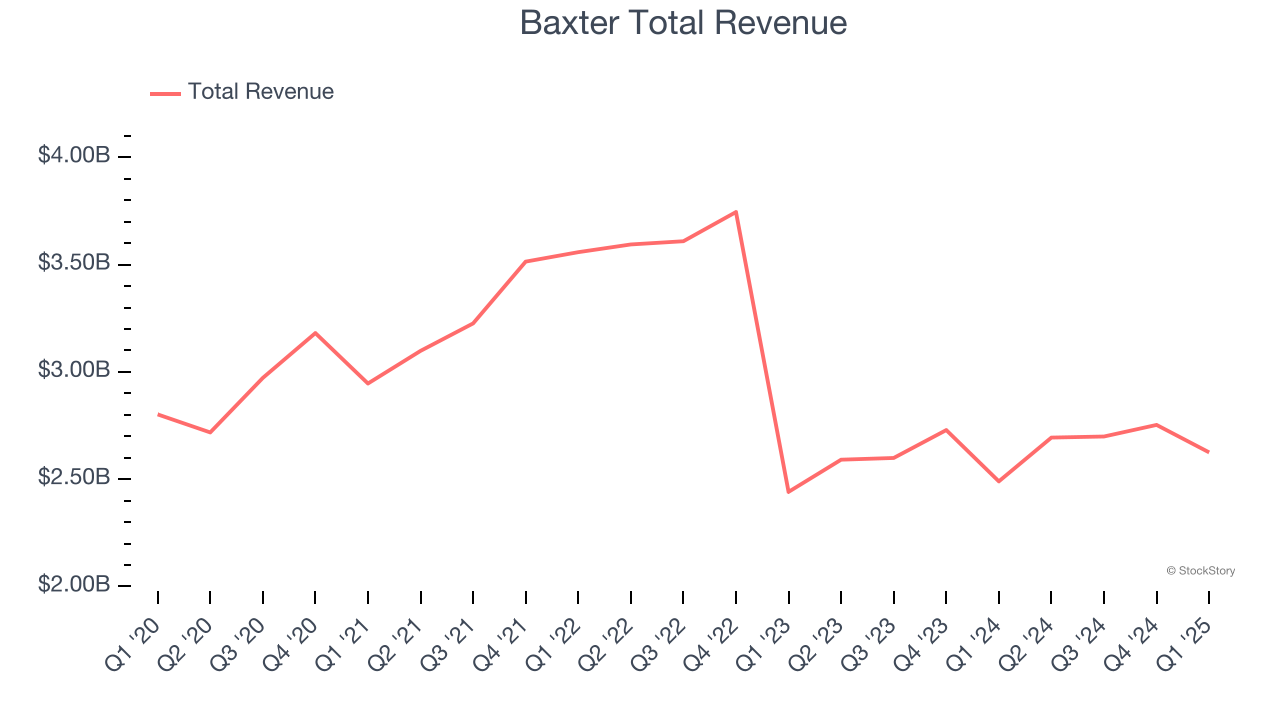
Looking back on medical devices & supplies - diversified stocks’ Q1 earnings, we examine this quarter’s best and worst performers, including CooperCompanies (NASDAQ:COO) and its peers.
The medical devices industry operates a business model that balances steady demand with significant investments in innovation and regulatory compliance. The industry benefits from recurring revenue streams tied to consumables, maintenance services, and incremental upgrades to the latest technologies. However, the capital-intensive nature of product development, coupled with lengthy regulatory pathways and the need for clinical validation, can weigh on profitability and timelines. In addition, there are constant pricing pressures from healthcare systems and insurers maximizing cost efficiency. Over the next several years, one tailwind is demographic–aging populations means rising chronic disease rates that drive greater demand for medical interventions and monitoring solutions. Advances in digital health, such as remote patient monitoring and smart devices, are also expected to unlock new demand by shortening upgrade cycles. On the other hand, the industry faces headwinds from pricing and reimbursement pressures as healthcare providers increasingly adopt value-based care models. Additionally, the integration of cybersecurity for connected devices adds further risk and complexity for device manufacturers.
The 6 medical devices & supplies - diversified stocks we track reported a mixed Q1. As a group, revenues beat analysts’ consensus estimates by 1% while next quarter’s revenue guidance was in line.
Amidst this news, share prices of the companies have had a rough stretch. On average, they are down 5.5% since the latest earnings results.
CooperCompanies (NASDAQ:COO)
With a history dating back to 1958 and a portfolio spanning two distinct healthcare segments, Cooper Companies (NASDAQ:COO) develops and manufactures medical devices focused on vision care through contact lenses and women's health including fertility products and services.
CooperCompanies reported revenues of $1.00 billion, up 6.3% year on year. This print exceeded analysts’ expectations by 0.8%. Overall, it was a satisfactory quarter for the company with a solid beat of analysts’ full-year EPS guidance estimates.
Commenting on the results, Al White, CooperCompanies' President and CEO said, "This was another solid quarter driven by double-digit growth in CooperVision's daily silicone hydrogel portfolio and CooperSurgical's office and surgical portfolio. As we move forward, our teams remain focused on taking share, delivering leverage, launching products and completing capacity expansion projects."

CooperCompanies pulled off the highest full-year guidance raise of the whole group. Even though it had a relatively good quarter, the market seems discontent with the results. The stock is down 3.8% since reporting and currently trades at $69.54.
Is now the time to buy CooperCompanies? Access our full analysis of the earnings results here, it’s free.
Best Q1: Baxter (NYSE:BAX)
With a history dating back to 1931 and products used in over 100 countries, Baxter International (NYSE:BAX) provides essential healthcare products including dialysis therapies, IV solutions, infusion systems, surgical products, and patient monitoring technologies to hospitals and clinics worldwide.
Baxter reported revenues of $2.63 billion, up 5.4% year on year, outperforming analysts’ expectations by 1.9%. The business had a very strong quarter with a solid beat of analysts’ constant currency revenue estimates and an impressive beat of analysts’ EPS estimates.

Although it had a fine quarter compared its peers, the market seems unhappy with the results as the stock is down 3.8% since reporting. It currently trades at $29.99.
Is now the time to buy Baxter? Access our full analysis of the earnings results here, it’s free.
Weakest Q1: Neogen (NASDAQ:NEOG)
Founded in 1981 and operating at the intersection of food safety and animal health, Neogen (NASDAQ:NEOG) develops and manufactures diagnostic tests and related products to detect dangerous substances in food and pharmaceuticals for animal health.
Neogen reported revenues of $221 million, down 3.4% year on year, falling short of analysts’ expectations by 1.5%. It was a disappointing quarter as it posted a significant miss of analysts’ EPS estimates and full-year EBITDA guidance missing analysts’ expectations.
Neogen delivered the weakest performance against analyst estimates, slowest revenue growth, and weakest full-year guidance update in the group. As expected, the stock is down 31.3% since the results and currently trades at $4.82.
Read our full analysis of Neogen’s results here.
Boston Scientific (NYSE:BSX)
Founded in 1979 with a mission to advance less-invasive medicine, Boston Scientific (NYSE:BSX) develops and manufactures medical devices used in minimally invasive procedures across cardiovascular, urological, neurological, and gastrointestinal specialties.
Boston Scientific reported revenues of $4.66 billion, up 20.9% year on year. This result topped analysts’ expectations by 2%. It was a very strong quarter as it also put up an impressive beat of analysts’ organic revenue and EPS estimates.
Boston Scientific achieved the fastest revenue growth among its peers. The stock is up 7.9% since reporting and currently trades at $102.47.
Read our full, actionable report on Boston Scientific here, it’s free.
Abbott Laboratories (NYSE:ABT)
With roots dating back to 1888 when founder Dr. Wallace Abbott began producing precise, dosage-form medications, Abbott Laboratories (NYSE:ABT) develops and sells a diverse range of healthcare products including medical devices, diagnostics, nutrition products, and branded generic pharmaceuticals.
Abbott Laboratories reported revenues of $10.36 billion, up 4% year on year. This number was in line with analysts’ expectations. Aside from that, it was a mixed quarter as it also produced a decent beat of analysts’ EPS estimates but a slight miss of analysts’ organic revenue estimates.
The stock is up 5.9% since reporting and currently trades at $133.63.
Read our full, actionable report on Abbott Laboratories here, it’s free.
Market Update
In response to the Fed’s rate hikes in 2022 and 2023, inflation has been gradually trending down from its post-pandemic peak, trending closer to the Fed’s 2% target. Despite higher borrowing costs, the economy has avoided flashing recessionary signals. This is the much-desired soft landing that many investors hoped for. The recent rate cuts (0.5% in September and 0.25% in November 2024) have bolstered the stock market, making 2024 a strong year for equities. Donald Trump’s presidential win in November sparked additional market gains, sending indices to record highs in the days following his victory. However, debates continue over possible tariffs and corporate tax adjustments, raising questions about economic stability in 2025.
Want to invest in winners with rock-solid fundamentals? Check out our Top 5 Growth Stocks and add them to your watchlist. These companies are poised for growth regardless of the political or macroeconomic climate.
